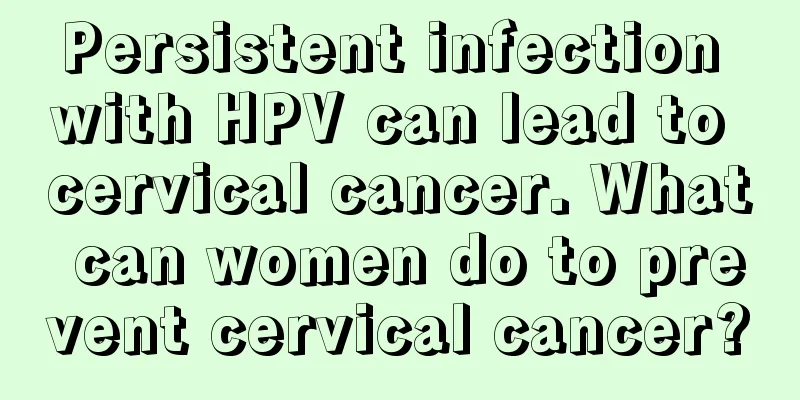Persistent infection with HPV can lead to cervical cancer. What can women do to prevent cervical cancer?

|
Cervical cancer is one of the most common cancers in women. It not only ranks first among cancers of the female reproductive organs, but is also the most common cancer among various malignant tumors in women. However, there are obvious regional differences in its incidence. The occurrence and geographical distribution of cervical cancer in my country are characterized by the fact that high-incidence areas are often connected into one piece, and cities and counties in various provinces with high-incidence areas of cervical cancer are also often connected to each other. The overall trend is that rural areas are higher than cities, and mountainous areas are higher than plains. According to the review and investigation of 29 provinces, cities, and autonomous regions, the mortality rate of cervical cancer in my country ranks fourth among the total cancer mortality rate and second among female cancers. The average age of onset of cervical cancer patients is also different. The age of onset in China is at most 40 to 50 years old, 60 to 70 years old, and it is rare before the age of 20. Many people believe that infection with the human papillomavirus (HpV) is necessary for the development of cervical cancer. In fact, the virus is sexually transmitted, but most types of infection can be prevented with the latest vaccines. HPV infection significantly reduces a woman's risk of cervical cancer. Usually, persistent infection with HPV later, cervical cancer develops slowly, and early cancer lesions are called atypical hyperplasia. If found at this stage, they can be treated more effectively to prevent the development of cervical cancer; pasteurization coating and HPV screening can detect these precancerous lesions. How to prevent cervical cancer in life? 1. Advocate for late marriage, late childbearing and family planning to avoid cervical damage. For women under 16 who have early sexual life or give birth early, due to the immature development of the lower reproductive tract, they are more sensitive to the stimulation of carcinogens; repeated miscarriages can also damage the cervix, weaken the body's resistance, and increase the risk of HPV infection. At the same time, studies have found that the incidence of cervical cancer increases with the number of pregnancies. Therefore, advocating late marriage, late childbearing and family planning is also a way to protect the uterus. 2. Sexual life must be safe and moderate: Sexual indulgence or disorder, such as multiple sexual partners, or minors starting sexual life, will lead to cervical injury and increased probability of human papillomavirus (HpV) infection, thereby increasing the risk of cervical cancer. 3. Pay attention to personal hygiene and keep the vulva clean: Female friends should try to use less sanitary pads. Because these products have poor air permeability, frequently used underwear, body shaping underwear and nylon pantyhose can easily lead to bacterial growth and cause inflammation of the reproductive system. Eating some animal liver can help prevent cervical cancer Through the investigation of women in areas with a high incidence of cervical cancer, it was found that women with significantly insufficient folic acid content are not only prone to fetal neural tube malformations, but also increase the risk of cervical cancer. Therefore, women should take appropriate folic acid supplements, including taking folic acid supplements and consuming foods rich in folic acid, such as animal liver and kidney, spinach, cabbage, amaranth, leek, fish, eggs, grains, soy products, nuts, etc., to effectively prevent and reduce the incidence of cervical cancer. Experts especially remind that since folic acid is not heat-resistant, the cooking temperature should be slightly higher, the cooking temperature should not be too high, and the cooking time should not be too long. Eat more red-skinned fruits and vegetables to prevent cervical cancer Red fruits and vegetables such as red apples and red peppers contain certain natural phytochemicals that can effectively inhibit the growth of some gynecological tumor cells and reduce their response to estrogen, thereby preventing gynecological tumors. In addition, onions, purple grapes and other fruits and vegetables have similar effects. |
Recommend
What are the dangers of testicular cancer?
Many people are very curious about the dangers of...
Is prostate cancer harmful? Can it be cured?
Prostate cancer is very harmful, but early detect...
Treatment of esophageal cancer in an 80-year-old man
Esophageal cancer may face more challenges in pat...
What to do if anxiety disorder relapses
As people are under increasing pressure, the numb...
What are the traditional Chinese medicine prescriptions for gynecological inflammation
I often hear some friends say, "It's so ...
Bladder cancer cure rate for children
Bladder cancer is one of the most common cancers....
The reason why acne appears between eyebrows
Acne on the forehead is related to your mood. Bei...
The method of stewing chicken with Panax notoginseng root actually has such medicinal value
It is not uncommon to see chicken stewed with Pan...
How to reduce swollen lips the fastest? 5 methods that work wonders
There are many reasons for swollen lips in life, ...
What are the benefits of applying barley water to the face
People all know that barley water is very good fo...
What to do if you have diarrhea due to uremia
Uremia is a very serious disease. It is a syndrom...
What should I do if my feet smell due to sweating in summer?
In summer, due to the hot weather, feet tend to s...
What causes anal itching
Many friends may have experienced itchy anus in t...
What are the typical symptoms of phv virus infection
Genital warts caused by HPV virus infection have ...
How to treat dry throat and cough
Throat infection accompanied by cough is mainly c...









